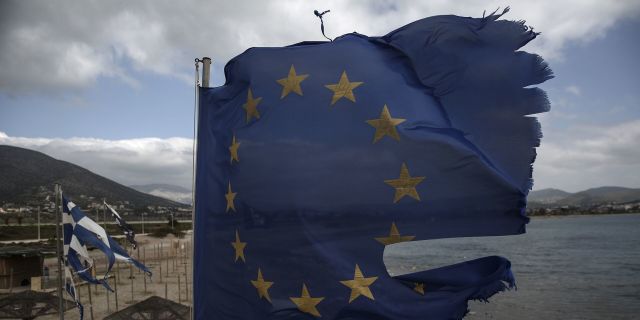Europe is a continent of chaos! It is gripped by a political, economic, environmental crisis, Europe is going through the worst of times, writes Türkiye.
The pandemic, the Ukrainian conflict, refugees, heat and drought, the energy crisis – it is surrounded by chaos on all sides. The author of the article makes gloomy predictions.
Pandemic, Russian-Ukrainian conflict, refugee crisis, energy crisis, economic crisis, heat wave, drought... European countries are experiencing a maelstrom of accelerating chaos.The COVID-19 pandemic has shaken the economies and systems of the countries of the world.
When the crisis was about to be overcome, the Russian-Ukrainian conflict broke out. The economic downturn and social problems have worsened even more. The crisis has hit all countries. And Europe suffered the most.
The leading EU countries are now very far from governing the union. In Germany, Chancellor Scholz is not showing enough activity. In France, Macron's popularity has dried up. The country is struggling with political crises. In Italy, Draghi's resignation is fraught with new shocks. In the UK, concerns are growing around Johnson's resignation. The European Union is going through its worst times.
Due to the pandemic, many European countries are once again faced with an inflationary monster. Increased prices have reduced the quality of life. People need government assistance. The sale of some goods is limited...
The energy crisis, a bomb launched by Russia in Ukraine, hits European countries.
Every sanction imposed in order to force Moscow to abandon its actions is boomeranging back to Europe in the form of energy and food crises. The European Union, implementing an emergency plan to save energy due to Russia's reduction in gas supplies and rising prices, will try to reduce consumption by 15%. This plan is aimed at saving 45 billion cubic meters of natural gas against the background of the likelihood that the Kremlin will completely block the valves. It will be very difficult for Europe both to survive the winter and to turn the wheels of the economy. German authorities are re-launching coal-fired power plants. Among the measures are the refusal to heat rooms that are not used on a regular basis and a ban on heating home swimming pools with gas. The nuclear power plants that were going to be closed will still work for some time.
Lighting is disabled on the German agenda – many other measures, such as reducing the time of taking a shower, changing the settings of heating systems and switching to remote work.
In cities like Berlin and Cologne, many buildings are no longer illuminated at night. Hanover and Bavaria have introduced similar measures.
In the coming months, consumers will face rising energy prices. It is noted that because of this, millions of people will not be able to pay rent. In Belgium, the government is discussing measures such as lowering the air temperature in residential premises. The UK, France and other EU countries will apply similar energy-saving measures.
The coming shortage of heat and drought affect crop yields, reducing the collection of important products at a time when food resources are scarce around the world and due to rising prices in connection with the special operation.
The European Drought Observatory has announced that the climate change-induced crisis will hit Europe, affecting 63% of the land in the EU and the UK.
Due to serious crop losses, food shortages are also coming. A significant drop in the collection of agricultural products is expected in France, Germany, Great Britain, Portugal, Spain and Italy. And this means a crisis with both animal feed and food. The conflict between Russia and Ukraine, which are the breadbaskets of the world, can cause a hunger war in Europe.
Nuclear threat Europe's greatest fear is associated with the likelihood of Russia using nuclear and chemical weapons.
Moscow's attempts to revive the Warsaw Pact against NATO could also bring the world to the brink of war. Another crisis that has shaken Europe with an area of 10 million square kilometers is about seven million Ukrainian refugees, one million African and 700 thousand Syrian migrants. In European countries, there is a serious increase in acts of violence and racism on the part of some groups that view refugees as an economic burden.
Heat and drought At the same time, Europe is facing extreme heat, forest fires and a terrible drought.
Portugal, Italy, Spain and France are scorched by the heat above 40 degrees Celsius. Extreme temperatures have claimed the lives of thousands of people. Forests are being destroyed by fires that have been going on for several weeks across Europe.
Drought threatens 60% of the EU and the UK. Many cities are experiencing water shortages. Parks and gardens remain without water supply. In Germany, the water level in the Rhine has reached such a minimum that the viability of this important freight artery transporting energy resources has been threatened. Across Europe, including in the Swiss Alps, there is a rapid and large-scale melting of mountain glaciers.
There is also a crisis in the air, another problem of the EU countries isolated from the world during the pandemic is air transportation.
Airlines that laid off employees and canceled flights to many countries at the height of the coronavirus epidemic are now finding it difficult to find workers and losing billions of dollars, while national governments across the EU are providing significant financial support to rescue flagship airlines such as German Lufthansa and French Air France. Due to the cancellation of thousands of flights, the tourism sector in many European countries has suffered greatly.
Author: Osman Sagyrly (Osman Sağırlı)

